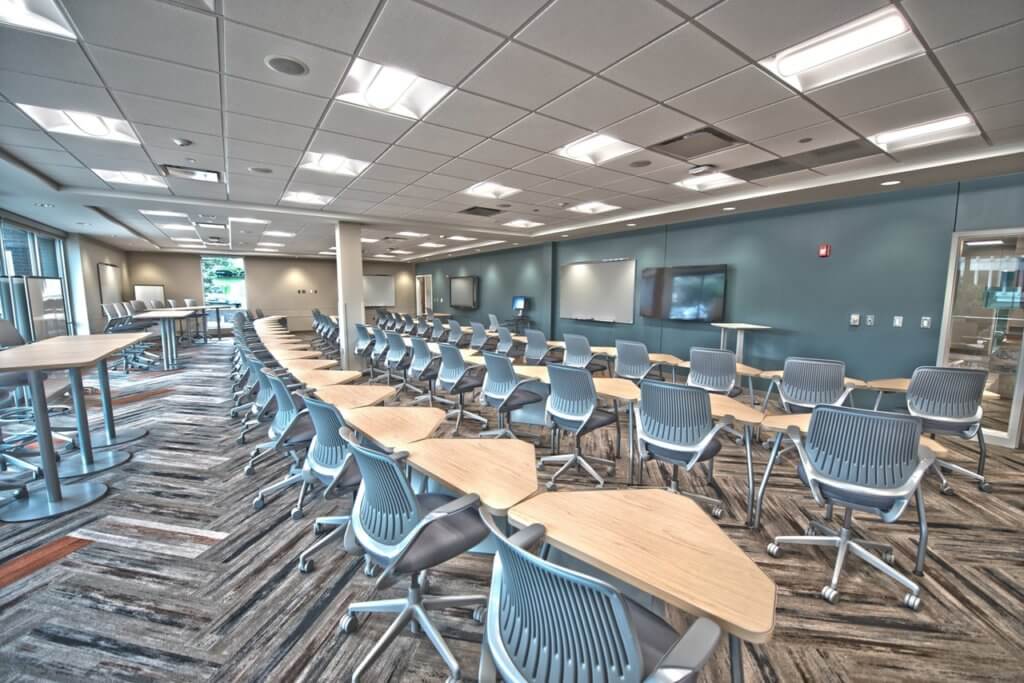
How to Rent a Conference Room: 4 Key Things to Look For
If you need to rent a conference room for a business meeting or corporate presentation, getting started can be the hardest part. It might seem straightforward, but with so many options in your area, you might overlook details that could end up costing you.

Before you book a meeting room, keep these four essentials in mind
1. Meeting room ambiance
Not all meeting rooms are created equal. Neither are the kinds of meetings you host.
Ideally, you want a meeting space that complements the nature of your meeting. For instance:
- If you’re meeting with clients or prospects, pick a room that projects professionalism.
- For all-day workshops, you might need a flexible space with on-site catering.
- Are presentations on the agenda? You might want a small stage. At the very least, you need high-quality event A/V equipment.
- Consider the size, too: Do you want the room to feel spacious or full when all the attendees are there?
Don’t sacrifice meeting room ambiance and amenities in the name of saving money.

2. Facility offerings
When considering a conference room rental, you need to know what’s included. There are a few basic things you might need, such as:
- Reliable Wi-Fi for all attendees
- A microphone for speakers
- A projector
- Video conferencing capabilities
- A printer
If something isn’t included in the meeting room rental cost, it’s a new line item ” and you’ll need to budget for it.
On-site support is another factor. For example, on-site IT staff or caterers can take a lot of weight off your shoulders. The last thing you need is for the tech to fail in the middle of the meeting without any support on hand. Figure out what kind of support is included with your meeting rental before you select a venue.
3. Actual meeting room rental cost
Let’s talk numbers. Before signing any contracts, you need to figure out the meeting room cost ” and more importantly, the hidden event planning costs involved.
In addition to the actual conference room rental rate, look out for added costs like:
- Setup and strike fees
- Access to power
- Taxes
- Service fees
- Tips
Run through the exact costs of the meeting room rentals before signing on the dotted line. Event budget pro tip: add a line item for unexpected costs just in case. You never know when these might come up:
Once you know the costs associated with renting a conference room, consider the payment terms. Is a deposit required? If so, what percentage? Will you have to pay a balance before or after the event? What payment options are available? Finding out how much you’ll need to pay and when will help you pick the best meeting room rental for your budget.
4. Convenience and accessibility
Keep your attendees in mind when selecting the meeting room. You want to create a convenient experience for them by:
- Choosing a nearby location, so that there’s very little travel involved
- Arranging ample parking for free or a low cost
- Helping attendees travel via public transportation
While it could be cheaper to choose a meeting venue that is a little bit far away, it could be inconvenient for your attendees.
For attendees who may need additional physical accessibility, find a space that can accommodate. Is there a ramp available? Where are the elevators? These may not be immediately obvious, so ask the venue for guidance. If the venue has some limitations (for example, wheelchair ramps aren’t close to the main meeting room), equip your self with extra staff and signage on the day of your event.
Meeting room rentals will vary from property to property. Be sure to consider these four things before you rent a conference room for your event.
What do you take into consideration before selecting meeting room rentals? Give us a shout in the comments or let us know on Facebook!
More like this:
What to Consider When Choosing an Event Venue
Why Your Venue Cost Comparison Numbers May Be Wrong
The Ultimate Site Inspection Checklist & Guide for Planners

